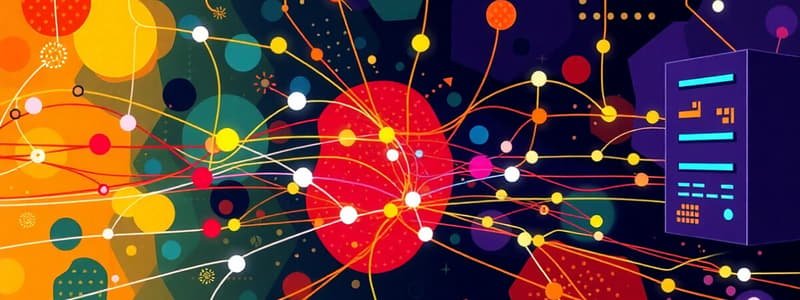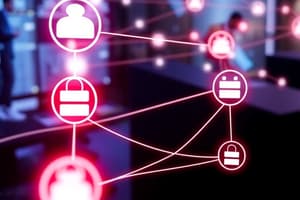Podcast
Questions and Answers
What type of network connects hundreds of millions of computers worldwide?
What type of network connects hundreds of millions of computers worldwide?
- Small Office/Home Office
- World Wide Networks (correct)
- Small Home Networks
- Medium to Large Networks
A client computer can function as a server in a peer-to-peer network.
A client computer can function as a server in a peer-to-peer network.
True (A)
What are the two main types of computers in a network?
What are the two main types of computers in a network?
Clients and servers
In a network, ________ are computers that provide information to end devices.
In a network, ________ are computers that provide information to end devices.
Match the following types of networks with their descriptions:
Match the following types of networks with their descriptions:
Which is NOT an advantage of peer-to-peer networks?
Which is NOT an advantage of peer-to-peer networks?
Medium to large networks typically consist of a few interconnected computers.
Medium to large networks typically consist of a few interconnected computers.
What is one disadvantage of a peer-to-peer network?
What is one disadvantage of a peer-to-peer network?
What are the two main types of network security?
What are the two main types of network security?
The three goals of network security are confidentiality, usability, and integrity.
The three goals of network security are confidentiality, usability, and integrity.
What does BYOD stand for in the context of networking?
What does BYOD stand for in the context of networking?
The assurance that only intended recipients can read the data is known as __________.
The assurance that only intended recipients can read the data is known as __________.
Which of the following is NOT one of the new networking trends affecting organizations?
Which of the following is NOT one of the new networking trends affecting organizations?
Availability in network security guarantees timely access to data for all users.
Availability in network security guarantees timely access to data for all users.
List one main component of network infrastructure security.
List one main component of network infrastructure security.
Match the following network security goals with their meanings:
Match the following network security goals with their meanings:
What is an intranet?
What is an intranet?
An extranet allows access to an organization's network for users from different organizations.
An extranet allows access to an organization's network for users from different organizations.
Name two popular services for home users and small offices to connect to the Internet.
Name two popular services for home users and small offices to connect to the Internet.
A high bandwidth, always on, Internet connection offered by cable television service providers is known as _____ .
A high bandwidth, always on, Internet connection offered by cable television service providers is known as _____ .
Which of the following is NOT a common method of Internet connection for organizations?
Which of the following is NOT a common method of Internet connection for organizations?
DSL connections run over power lines.
DSL connections run over power lines.
Match the following Internet connection types with their descriptions:
Match the following Internet connection types with their descriptions:
Business-class interconnections may include business DSL, _____, and Metro Ethernet.
Business-class interconnections may include business DSL, _____, and Metro Ethernet.
What does BYOD stand for?
What does BYOD stand for?
Collaboration tools like Cisco WebEx are only important for businesses and not for education.
Collaboration tools like Cisco WebEx are only important for businesses and not for education.
Name one benefit of cloud computing for businesses.
Name one benefit of cloud computing for businesses.
Cloud computing allows users to access applications such as word processing and ____ editing.
Cloud computing allows users to access applications such as word processing and ____ editing.
Which of the following is NOT a type of device enabled by BYOD?
Which of the following is NOT a type of device enabled by BYOD?
Public Clouds offer services to specific organizations only.
Public Clouds offer services to specific organizations only.
Match the following types of Clouds with their descriptions:
Match the following types of Clouds with their descriptions:
What is one way smaller companies can benefit from cloud computing?
What is one way smaller companies can benefit from cloud computing?
Which of the following is considered an external threat to network security?
Which of the following is considered an external threat to network security?
Internal users cause the majority of security breaches in a network.
Internal users cause the majority of security breaches in a network.
Name two types of external threats to network security.
Name two types of external threats to network security.
A __________ attack is also known as a zero-hour attack.
A __________ attack is also known as a zero-hour attack.
What is a recommended solution for securing network devices?
What is a recommended solution for securing network devices?
Match the following security solutions to their purposes:
Match the following security solutions to their purposes:
Quality of service is not affected by the implementation of security measures.
Quality of service is not affected by the implementation of security measures.
What does BYOD stand for, and why is it a concern for network security?
What does BYOD stand for, and why is it a concern for network security?
Flashcards are hidden until you start studying
Study Notes
Networks of Many Sizes
- Small Home Networks connect a few computers to each other and the Internet.
- Small Office/Home Office networks enable computers in a home or a remote office to connect to a corporate network.
- Medium to Large Networks have many locations with hundreds or thousands of interconnected computers.
- World Wide Networks connect hundreds of millions of computers worldwide, like the Internet.
Clients and Servers
- Every computer connected to a network is called a host or end device.
- Servers are computers that provide information to end devices on the network.
- Clients are computers that send requests to servers to retrieve information, such as a web page from a web server or email from an email server.
Peer-to-Peer
- Client and server software typically run on separate computers.
- Peer-to-peer networks allow clients to also function as servers.
- Advantages of peer-to-peer networks include easy setup, less complexity, and lower cost.
- Disadvantages of peer-to-peer networks include no centralized administration, less security, not being scalable, and slower performance.
Intranets and Extranets
- Intranets are private collections of LANs and WANs internal to an organization, accessible only to authorized members.
- Extranets provide secure access to an organization's network for individuals outside of the organization who require access.
Internet Access Technologies
- Internet access technologies include broadband cable, broadband digital subscriber line (DSL), wireless WANs, and mobile services, popular for home users & small offices.
- Businesses often utilize business DSL, leased lines, and Metro Ethernet for faster connections to support IP phones, video conferencing, and data center storage.
Home and Small Office Internet Connections
- Cable provides high bandwidth, always-on Internet connection offered by cable television providers.
- DSL also provides high bandwidth, always-on Internet connection that runs over a telephone line.
Reliable Network Security
- Network security addresses two main types: network infrastructure security and information security.
- Network Infrastructure Security focuses on physical security of network devices and preventing unauthorized access to device management software.
- Information Security aims to protect data transmitted over the network.
- Network security has three goals: confidentiality, integrity, and availability.
- Confidentiality ensures only intended recipients can access the data.
- Integrity guarantees data remains unaltered during transmission.
- Availability ensures timely and reliable data access for authorized users.
Network Trends
- Networks must adapt to keep up with new technologies and end-user devices.
- Major trends include Bring Your Own Device (BYOD), online collaboration, video communications, and cloud computing.
Bring Your Own Device (BYOD)
- BYOD allows users to utilize their own devices, increasing opportunities and flexibility.
- End users can access information and communicate using personal devices such as laptops, netbooks, tablets, smartphones, and e-readers.
Online Collaboration
- Users seek to collaborate and work on joint projects over the network.
- Collaboration tools like Cisco WebEx enable instant connection, interaction, and achievement of objectives.
Cloud Computing
- Cloud computing allows storing personal files or backing up data on servers over the Internet.
- Cloud access provides access to applications like word processing and photo editing.
- Businesses use cloud computing to extend capabilities on demand and deliver services automatically to any device globally.
- Data centers enable cloud computing, especially for smaller companies that lease server and storage services.
Cloud Computing Types
- Public Clouds offer services and applications to the general public through pay-per-use models or for free.
- Private Clouds are intended for a specific organization or entity like the government.
Network Security Threats
- Network security is crucial, regardless of network size.
- Network security implemented should consider the particular environment while securing data, but still enabling the expected Quality of Service.
- Network security involves numerous protocols, technologies, devices, tools, and techniques to protect data and combat threats.
- Threat vectors can originate from external or internal sources.
External Threats
- External threats include viruses, worms, Trojan horses, spyware, adware, zero-day attacks, hacker attacks, denial of service attacks, data interception and theft, and identity theft.
Internal Threats
- Intentional or unintentional, studies indicate that internal network users cause the most security breaches.
- BYOD strategies increase vulnerabilities for corporate data.
Network Security Solutions
- Security implementation should utilize multiple layers with various solutions.
- Network security components for home or small office networks include:
- Antivirus and antispyware software on end devices.
- Firewall filtering to block unauthorized access to the network.
Studying That Suits You
Use AI to generate personalized quizzes and flashcards to suit your learning preferences.




